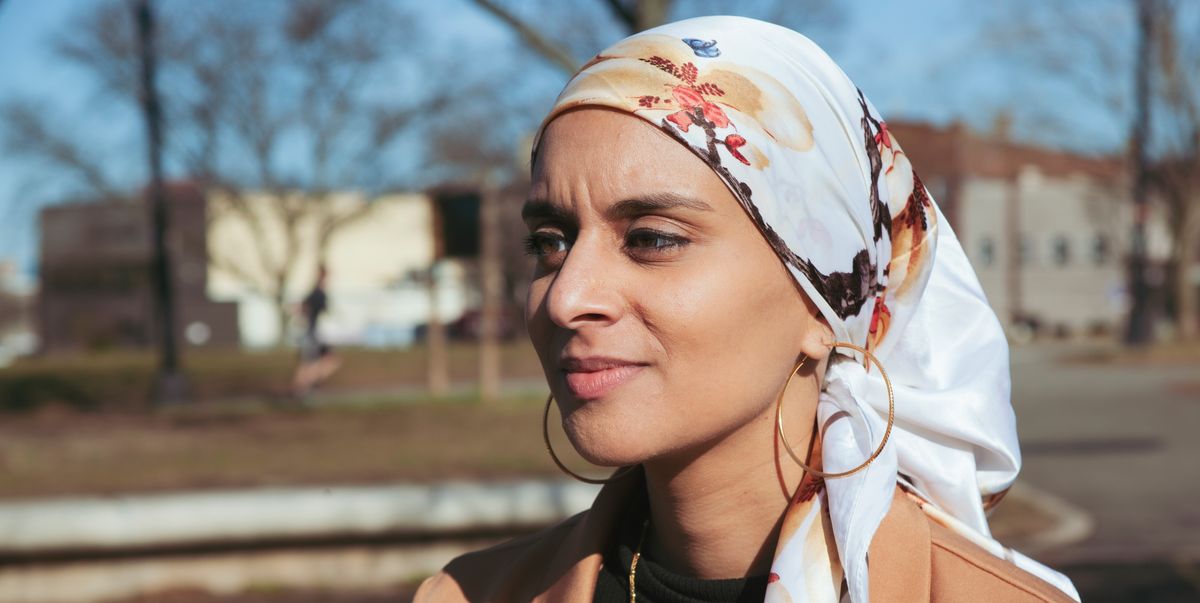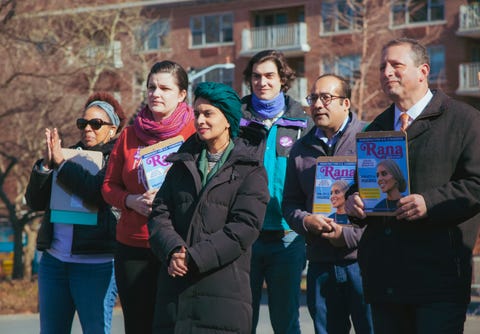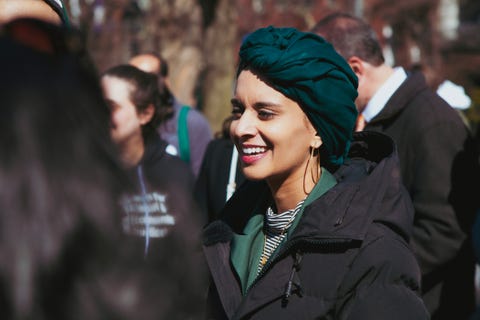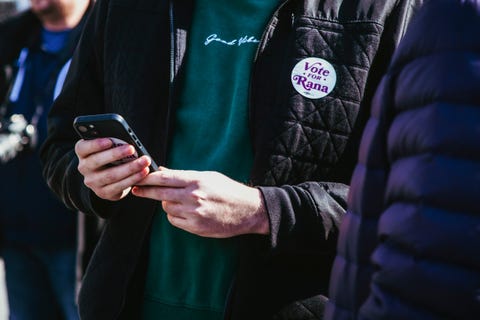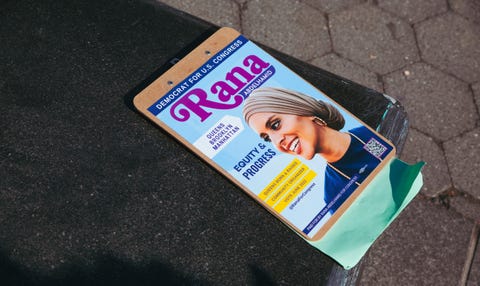Products You May Like
On a spring Monday morning in Washington Square Park, 28-year-old congressional hopeful Rana Abdelhamid spoke about the future she wants for New York.
“This is a historic race,” Abdelhamid told supporters. “Not just because if I win, I will be the first Muslim woman representing New York, but because we’re building a coalition that we’re going to take with us once elected.”
Abdelhamid, who was campaigning in a black puffer jacket, hoop earrings, a teal headscarf and white sneakers, has never before held an elected political office.
“Seeing the neglect, lack of investment, and lack of representation for my community, working people across the city, immigrant communities and people of color, lead me to realize that we need representatives that are going to fight for us the way we fight for each other,” Abdelhamid said in an interview with ELLE.com.
Abdelhamid faces an uphill fight for New York’s 12th District nomination, challenging incumbent Democrat Carolyn Maloney, who was first elected to Congress in 1992 and has held her current seat since 2013.
After nearly 30 years in Washington, progressives criticize Maloney, who chairs the House Committee on Oversight and Reform, for voting to deregulate Wall Street banks and supporting punitive “tough on crime” legislation. A spokesperson for Rep. Maloney said in an email that “Congresswoman Maloney is a proven progressive leader.” The spokesperson also pointed out that Maloney was an original co-sponsor of the Green New Deal and is a member of the Congressional Progressive Caucus.
But in 2002, like most other House Democrats, she voted to invade Iraq. In the weeks after the Sept. 11 terror attacks, Maloney infamously wore a burqa on the House floor, railing against Afghanistan’s treatment of women to make the case for American military intervention.
It’s an image that had a lasting effect on Abdelhamid.
“I was nine years old when I watched my congresswoman wear a burqa to justify the invasion of Afghanistan,” Abdelhamid said in a tweet. “For the rest of my life, I knew that as a Muslim woman my identity would be weaponized to justify American wars.”
This content is imported from Twitter. You may be able to find the same content in another format, or you may be able to find more information, at their web site.
Growing up in post-9/11 New York was difficult for Abdelhamid. “My community was super stigmatized,” she explained in an interview with ELLE.com, “I internalized so much of that. It was difficult for me to cope as a young person.”
Abdelhamid began engaging in different forms of activism and social justice in her early teenage years. “Politics has always been a part of my existence,” she added. When she announced her bid for congress, it didn’t shock any of her friends, “They all were like, ‘it’s about time.’”
Unseating a longstanding incumbent is no easy task. But in 2018, insurgent challengers Alexandria Ocasio-Cortez in New York and Ayanna Presley in Massachusetts stunned the nation with victories over long-serving incumbent Democrats, launching a wave of young progressive candidates across the country. Many of these candidates were backed by Justice Democrats, a political action committee started by former leaders of Bernie Sanders’ 2016 campaign and other progressive organizations.
Taking a page from that progressive playbook, Abdelhamid is running on a platform of supporting Medicare for All, the Green New Deal, and housing and economic justice. Abdelhamid has earned endorsements from local council members, state senators, the Working Families Party of New York, and other progressive groups, among them New York City Comptroller Brad Lander, City Council member Tiffany Caban, and former gubernatorial candidate Cynthia Nixon, who all turned out for her rally.
Sochie Nnaemeka, the New York director of the Working Families Party, praised Abdelhamid’s ability to leverage her story “in a way that feels very universal.”
“Her campaign is grounded in what it means to be a working-class New Yorker, a woman of color, a young person growing up in the United States,” Nnaemeka said in a phone call.
The daughter of Egyptian Immigrants, Abdelhamid grew up in Astoria, Queens, where her family moved many times due to rising rents and poor housing conditions. She attended New York City public schools and has long been a community organizer. At 15, she was the victim of a hate crime when a man attacked her and tried to remove her headscarf. In response, Abdelhamid founded WISE, the Women’s Initiative for Self Empowerment, now known as Malikah, which teaches Muslim women self-defense tactics. The collective is still active and has hosted workshops in more than 18 cities around the world.
Just a few weeks ago on the campaign trail, Abdelhamid held an outdoor self-defense class for Asian women in Sunset Park, Brooklyn, in response to the recent spike in hate crimes against the Asian American Pacific Islander community.
“It was really powerful,” Abdelhamid said. “There was a parent there who had brought her daughter and she was so grateful that her daughter was learning self-defense. I love running these classes and I plan to do more of it.”
The diverse neighborhood, where many of the residents are Latino and Asian, made national news weeks later when a gunman opened fire in a subway station there, wounding 10 people.
At Middlebury College, Abdelhamid majored in international politics and economics and established the school’s Amnesty International chapter. After graduation, she attended Harvard’s Kennedy School of Government on a scholarship and earned a master’s degree in public policy. In 2014, Abdelhamid founded a social media project, “Hijabis of New York,” to humanize the public narratives of Muslim women who wear hijabs. The page has nearly 30,000 Facebook followers.
Currently, she lives in Queens and works in the marketing and partnerships department of Google’s Women Techmakers’ program, which aims to provide visibility, community, and resources for women in technology.
Ahead of her Washington Square rally, Abdelhamid sat on a bench in Rainey Park, Astoria and told me Cori Bush and Jamaal Bowman, who in 2020 won races over more centrist Democrats in Missouri and New York, inspired her to run for Congress.
“They spoke in ways that resonated with me,” she said. “When they talked about health care for all, or about fighting for the eviction moratorium, fighting for our schools, I had never seen elected officials speak in that way.”
More than 70 percent of residents in New York’s 12th District, where the median household income is around $120,000, are renters, according to Census data. (In 2020, the city’s median household income was just over $67,000.) But even that income level puts much of New York real estate out of reach as rents continue to rise.
“We shouldn’t be seeing rent spike 33 percent, 40 percent over one year. People are leaving the city,” Abdelhamid said. “Fighting for national rent control is important. We are fighting for opportunities, where we’ll be able to build and subsidize the building of affordable housing.”
District 12 is home to both the Upper East Side and the largest public housing unit in North America, the Queensbridge Houses in Long Island City, Queens, along with parts of Brooklyn and the Lower East Side of Manhattan. Abdelhamid supports the Green New Deal for Public Housing Act, introduced last year by Sanders and Ocasio-Cortez, to improve living conditions for public housing residents across the country by investing $172 billion over 10 years. The bill also focuses on health by addressing lead paint and mold in apartments. Data for Progress, a progressive research center, estimates that, if enacted, it could reduce asthma in these public housing communities by 18 to 30 percent. Abdelhamid grew up in a Queens neighborhood situated next to peaker power plants, an area known colloquially to residents as “Asthma Alley” due to the poor air quality, she explained.
“They don’t put peaker plants in rich neighborhoods,” Abdelhamid told supporters in Washington Square Park. “They put them where there are immigrant communities where Black and brown communities are, they think we won’t advocate for ourselves.”
But Abdelhamid’s fight could get even more difficult. Recently, District 12 was redrawn to remove Williamsburg, where Maloney suffered losses against candidate Suraj Patel in the last primary, as well as parts of the Lower East Side. The redistricting added parts of the Upper West Side, SoHo, and Greenwich Village.
Hank Sheinkopf, a veteran New York Democratic strategist and political consultant, explained that the newly drawn maps would likely be a boon for Maloney. “The parts that were added to her, are areas where she [Maloney] would do well.”
Earlier this month, however, a New York judge struck down the newly drawn lines. Just last week, an appeals court ruled that the new maps favor Democrats. Gov. Kathy Hochul and other top lawmakers are expected to appeal.
With the primary less than 100 days away, the Justice Democrats are supporting Abdelhamid’s campaign with critical infrastructure. Waleed Shahid, the communications director for the group, praised Abdelhamid as “a quintessential working-class New York story,” saying, “She represents the district that Maloney has increasingly grown out of touch with.”
Since 2018, Justice Democrats has endorsed fewer candidates. Instead of backing dozens, as it did that year, it’s picking its battles more selectively and has only so far endorsed six candidates nationwide for 2022.
“Ninety-seven percent of incumbents are re-elected every year,” Shahid said. “But we’ve shown that we’ve been able to overcome that financial gap before and I think we have a good shot doing it again.”
According to recent campaign finance filings, Maloney has so far raised just more than $2.2 million; Abdelhamid’s campaign has so far amassed just under $1 million.
Despite the fundraising gap, Maloney’s last two races have been close. Suraj Patel, a lawyer and Democratic operative, lost the 2020 primary by just 3,000 votes and is running for the third time this year.
Nathaniel Rakich, a senior elections analyst at FiveThirtyEight, noted that Maloney is not out of the woods. “She got less than a majority in 2020, only 43 percent,” he explained. “That certainly indicates that an incumbent is vulnerable.”
Being a young woman in politics is not easy. Despite plenty of support for her campaign, Abdelhamid has drawn some negative coverage from outlets like The New York Post, which recently critiqued her for working at Google while running an anti-corporate campaign.
“Having an issue with the fact that corporations have money in politics, and fund elected officials in politics, is different than being someone who is a worker at a company,” Abdelhamid told ELLE.com. “I’m not an executive at Google. I’m a worker, and my job at Google is actually to train women in online safety.”
Abdelhamid said she entered tech to help pay down her college debt, but now sees her experience as a benefit that “will allow me to legislate tech policy,” she said. She also said of the criticism that “My whole life has prepared me for this,” and that growing up in post-9/11 New York City, “There was so much stereotyping and mischaracterization of Muslim women.” Now, she said, her family and community are her source of strength.
Besides, the responses to her and her campaign so far have been far more positive than negative. “The campaign has been the most beautiful thing I have ever been a part of,” she said.
Whether the trend of insurgent progressive victories will continue is hard to predict, said elections analyst Rakich, but it partially depends on how these young candidates do.
This year, the trend of progressive Democrats running against incumbent Democrats is going strong with Abdelhamid, Summer Lee in Pennsylvania, and Kina Collins in Illinois, among others. In Texas, Justice Democrats endorsed candidate Jessica Cisneros, a 28-year-old immigration lawyer challenging Rep. Henry Cuellar, one of the most conservative Democrats in the House.
“AOC’s success inspired other people who thought, ‘AOC did it so maybe I can do it too,’” Rakich explained. “But if these candidates have a bad election cycle, that might have a dampening effect.”
Still, Abdelhamid is confident. “This is a multi-racial, inter-ethnic, inter-class, interfaith community that we are building in the city I love the most, for the city I love the most,” said Abdelhamid. “It’s a dream.”
The primary elections in New York are slated to be held on June 28.
This content is created and maintained by a third party, and imported onto this page to help users provide their email addresses. You may be able to find more information about this and similar content at piano.io
